Best practices (public lighting)
Contents
[hide]- 1 Introduction
- 2 List of best practices
- 2.1 Installation of two solar-benches at the Marjan hill area in the city of Split
- 2.2 Energy Rehabilitation of Public Lighting at Municipality of Komen
- 2.3 Construction and modernization of street lighting
- 2.4 Pedestrian crossing solar powered warning light
- 2.5 Intelligent street lighting
- 2.6 Energy Rehabilitation of Public Lighting at Municipality of Brda
- 2.7 Energy-efficient Street Lighting
- 3 Conclusions
- 4 Conclusions
Introduction
The best practices serve as a showcase of good examples and should be a first step to acknowledgment of new solutions.
The section includes solutions and best practices that are in line of the Toolkit focus and relate to the area of public and street lighting.
Best practices are comprised of the following resources:
- best practices that were collected from project partners, who identified them basing upon their experience they had from their region (project deliverable D.T1.1.1).
- best practices that are actually implemented by CitiEnGov Project partners and were collected during study visits in CitiEnGov regions.
- accomplishments that arrived from synergies of CitiEnGov project partners and existing European initiatives, projects and platforms that have a focus on renewable energy sources and energy efficiency.
List of best practices
Installation of two solar-benches at the Marjan hill area in the city of Split
Location
Marjan hill in the city of Split, Croatia
Description
Installed smart benches are energy independent, because they use power from solar panels. All the processes are controlled with two processors that are built-in within the bench. The solar bench is resistant to shocks and can work 10 days without the sun. Carriage capacity of the bench is 300 kilograms and can hold up to four people. Each bench has four USB ports for cell phones and tablets, night lightning, CO2 control, air temperature display, 60 watts power, and can produce 1 kW of electricity daily.
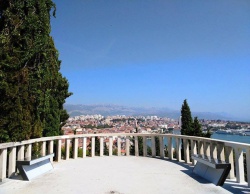
|
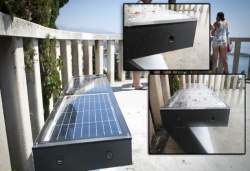
|
Link and contacts
http://www.marjan-parksuma.hr/
Energy Rehabilitation of Public Lighting at Municipality of Komen
Location
Municipality of Komen, Slovenia
Description
Energy consumption in Komen municipality for public lighting was 110,52 kWh/year per capita. In the project, 677 lights were replaced. The public lightning was not in conformity with the Decree on limit values, due to light pollution of environment (it was mostly inappropriate and incorrectly installed). The municipality, which is also the investor and equipment owner, obtained non-refundable funds through the public call E3URE. The concessionaire/contractor (an ESCO company) has paid to compensate (municipality) an abstraction fee in one off payment, at take over process of managing of public lighting. Concession duration is 15 years.
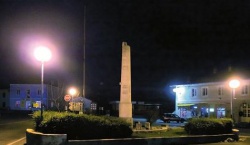
|
Link and contacts
http://www.primorske.si/Novice/Srednja/Luci-bodo-varcnejse
Construction and modernization of street lighting
Location
City of Bydgoszcz, Poland
Description
Improving Public Lighting System through the use of energy-efficient solutions (replacing the old light sources for energy – LED). In the city there were 7 309 units of luminaires and lighting cabinets exchanged and installed for lighting control system, that is reducing energy consumption.
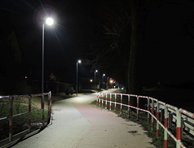
|
Link and contacts
http://www.zdmikp.bydgoszcz.pl
Pedestrian crossing solar powered warning light
Location
Grodzisk, Poland
Description
Regional authority has begun to install solar-powered pedestrian crossing warning lights on major roads under their management. Lights are installed on the pedestrian crossings with fatal accident record or the ones, which have high accident risk. No installation or maintenance cost to the city, which simply benefits from the action.
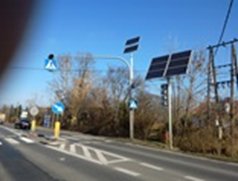
|
Link and contacts
http://www.inzynieria-ruchu.pl/oferta/solarny-system-oswietlenia-drog/realizacje.html
Intelligent street lighting
Location
Ludwigsburg (district Oststadt, Oßweil), Germany
Description
The City of Ludwigsburg’s innovation network Living Lab developed an "Intelligent street lighting" concept together with the local utility company (SWLB) and the company Trilux as a pilot project for energy saving, protecting the environment and furthermore, the animals. The innovative Trilux LED streetlights capture movements and automatically dim the light at low-traffic times. The intelligent street lighting is implemented at the foot and cycle path between the two districts Oßweil and Oststadt. The SWLB has put into operation 23 intelligent street lights. If vehicles, bicycles or pedestrians approach, the intelligent street lights capture the movements via sensors and light up the path where it is necessary. As a result, intelligent street light increases safety in the public space, whilst increasing energy efficiency and reducing costs (up to 60%of the energy costs). In the long term, the type of lighting saves up to 60 percent of energy costs. Furthermore, the lights make an important contribution to environmental protection by protecting insects, birds or bats from permanent light effects.
Link and contacts
http://www.ludwigsburg.de/,Lde/start/stadt_buerger/intelligente+strassenbeleuchtung.html
Energy Rehabilitation of Public Lighting at Municipality of Brda
Location
Municipality of Brda, Slovenia
Description
In Slovenia, the national light pollution Decree, stipulates target values for road and public area lighting. In that Decree, Article 5 specifically notes: “The annual electricity consumption of all lamps in the area of a municipality, built into the lighting systems of municipal roads and public areas managed by the municipality, calculated per person with residence in the municipality, must not exceed the target value of 44,5 kWh/person”. In Municipality Brda, this value was 87,2 kWh/person before the investment. After the successful tenderer, the municipality signed a long-term (10-year) concession for the renovation, maintenance and implementation of local utility public service - public lighting. The implementation process replaced 779 outdated lamps with new ones. The concessionaire owns the newly deployed public lighting equipment during the lifetime of the concession contract.
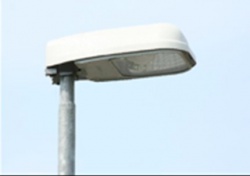
|
Link and contacts
http://www.covenantofmayors.eu/about/signatories_hr.html?city_id=5605&seap
Energy-efficient Street Lighting
Location
Vignola, Province of Modena, Italy
Description
The Municipality of Vignola is undergoing a renewal of public lighting. More than 3000 spots will be discarded (approximately 80% of total), being replaced by new highly efficient devices. Besides lamp replacement, the public lighting plan will rely on technology aimed at energy saving, low maintenance cost, smart applications such as Wi-Fi, video surveillance, charging devices for electric cars and bikes. Overall, the Municipality gains more than 60% of energy saving, at the same time providing better lighting standards, broadening public lighting and video surveillance coverage within town, offering new services. The amount of money saved on energy bills is enough to finance the plan, giving an indication of financial sustainability.
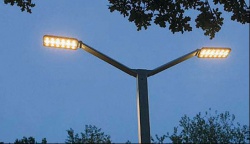
|
Link and contacts
http://illuminazionevignola.database.it/
Conclusions
xxxxxxxx
Conclusions
aaaa